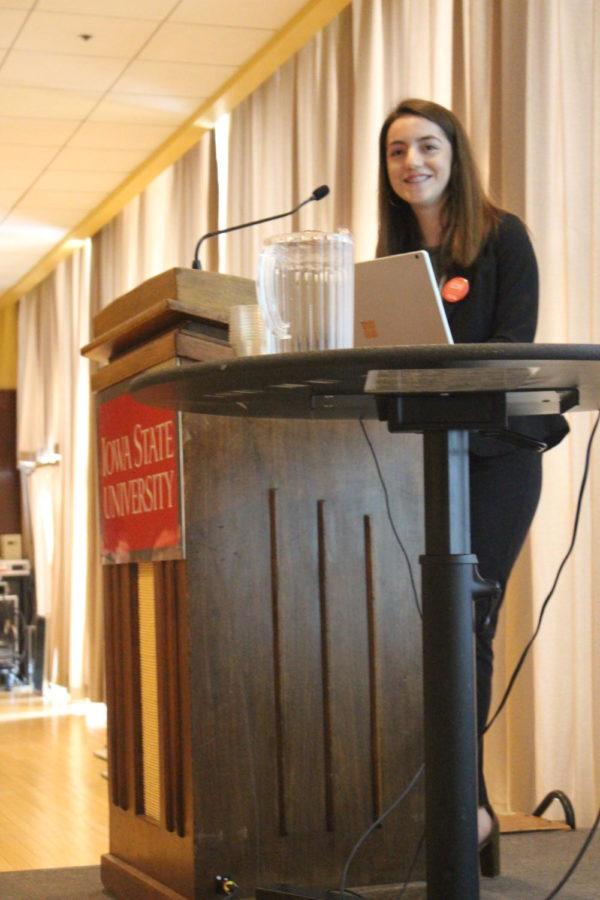ISCORE welcome and opening address
March 2, 2018
After closing registration this morning, 1,084 people had been registered. On Wednesday, the pre-registration number was at 700. Around 200 to 250 people were at the pre-conference on Wednesday.
Starting the conference, Japannah Kellogg, program coordinator III in the department of Vice President Student Affairs, spoke about last year. Iowa State had two guests from Texas A&M University. Throughout the day, they observed and were given a numerous amount of information.
“They thought the morning was rehearsed and planned, but for the most part, they were excited,” Kellogg said. Because of their visit, they started their own type of ISCORE titled, Race, Identity and Social Equality initiative (RISE). Their first conference was Feb. 2.
“Their schedule and everything looked like ours, and that was a good thing,” Kellogg said. “I think we should take credit for providing that blueprint.”
Kellogg spoke on events which took place last year during ISCORE.
“Our students want to be heard, we need to help them how to be heard,” Kellogg said. “We’re moving in the right direction, however we have work to do.”
Kellogg described the history of the event and thanked the planning committee with a round of applause.
“As we move forward we have a space we have created to have this dialogues,” Kellogg said.
After Kellogg spoke, Maeve McCloskey, sophomore in industrial engineering, presented “White wall,” in which she spoke on the wall of white privilege that has been created in our society.
“No bleach will take away the system that holds up those white walls,” McCloskey said.
“I can’t change that I was born a brick,” McCloskey said, “but I can choose what I do from here.
“So the voices that have been huffing and puffing for so long, can finally blow that fucking wall down.”
Wendy Wintersteen then presented opening remarks.
Over her years at Iowa State, Wintersteen has attended many of the ISCORE conferences. Wintersteen believes everyone should have the opportunity to succeed. But she also believes we have to provide a welcoming and inclusive environment.
In the future, Wintersteen believes “Iowa state will be the most welcoming and inclusive land grant institution,” Wintersteen said.
Wintersteen outlined that we must be equipping students to be successful in their careers.
“There is no one size fits all,” Wintersteen said.
“We have students that did not feel welcomed, in fact they felt threatened” Wintersteen said.
Through these conversations, Wintersteen followed one piece of advice.
“You need to simply shut up and listen,” Wintersteen said. “let them tell their story.”
As a result of these sessions, there were many actions such as a message to faculty outlining how they can better serve their students, especially their underrepresented students.
Pizza with the President and a symposium are two events organized to open up conversations with Wintersteen to learn more about underrepresented groups on campus.
Out of these conversations, Wintersteen took away two things. Iowa state can do a better job for underrepresented students and it is time to stop being shocked about the stories the staff is hearing from underrepresented students.
“As a president, I will be a white ally,” Wintersteen said.
“ISCORE is an important part of achieving this goal,” Wintersteen said.
The College of Human Sciences and the College of Agriculture and Life Sciences received the 2018 NCORE and ISCORE awards.
Wintersteen recognized various people on campus who are making efforts in diversity and inclusion.
“We are stronger together,”Wintersteen said.
Araceli Lopez, junior in political science, presented “Nice to meet you.” In this, she created dialogue around questions and comments she has received about her ethnicity and race.
“No I’m not Italian, I’m from Sioux City,” Lopez said.
“No I’m not half, both of my parents are from Mexico,” Lopez said.
José Antonio Rosa, Puerto Rican Native, is a professor in marketing and a John and Deborah Ganoe Faculty Fellow at Iowa State.
Rosa presented his speech, “Learning Puerto Rican: journey unfinished.” He began by speaking about the history of Puerto Rico and discussed why Puerto Rico still has not recovered from hurricane Maria. Rosa also spoke about the history of his family,
“Even out of an accidental life, good things can happen,” Rosa said.
Rosa came from a “multicolored” colored family.
“There’s an awful lot of color here, we run the gamut, ”Rosa said. “I wasn’t terribly aware of race, I was more aware of things like this, poverty.”
Rosa also spoke about how through the years he felt he had to be able to explain Puerto Rico and be able to put different Puerto Ricans in one “bucket.” Over the years, he tried to identify the different types of Puerto Ricans, “the Chicago Puerto Ricans,” the “coastal Puerto Ricans” and many more.
“Learning Puerto Rican: journey unfinished, and yet worth doing,” Rosa said.
















